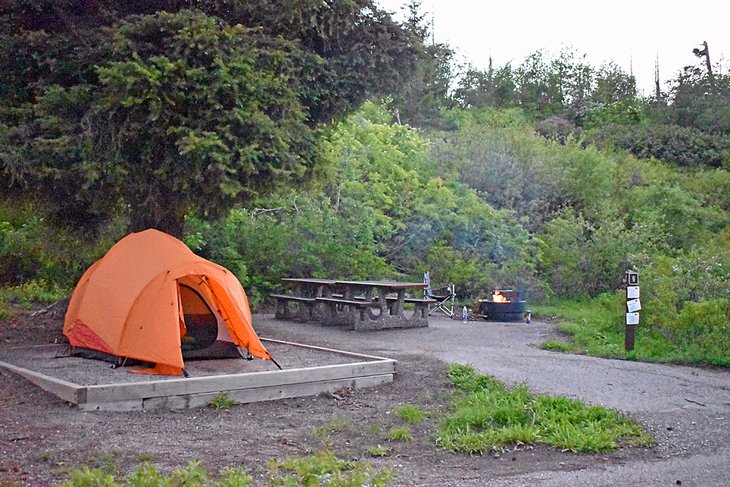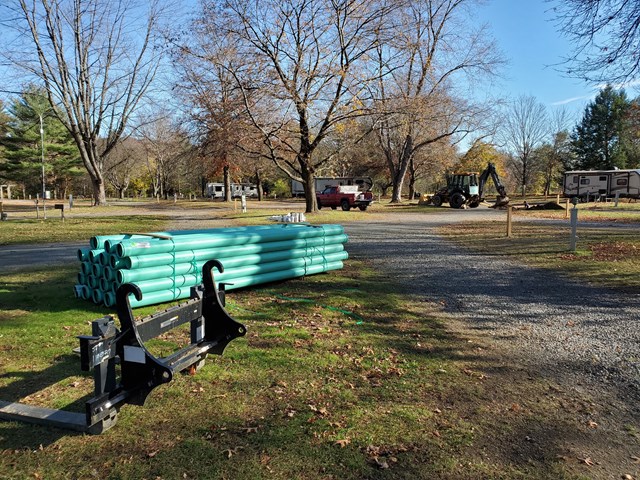Camping 3 Way Hookup Tent Site
While many campers enjoy a ‘back to basics’ approach to camping, there are plenty who prefer the creature comforts of a few electrical appliances during their holidays, and why not? Read on if you want to learn how to use our electric hook-up facility safely and efficiently.
$10.00 each additional person per night, kids under 5 always free! All RV Sites are 3 way hook up and Include; up to 50 Amp Power, Water and Sewer. Cable TV & A Reliable Wi-Fi connection Available at all RV Sites On a per visit cost basis. Full Hook-Up 50 Amp RV Sites Start at $55 Per night 42′ Maximum RV Length available. Check-in time for camping is 2PM. The only public access to this pristine lake is through Devil's Fork State Park in Salem, South Carolina. The park strictly enforces Leave No Trace ethics and park staff do a commendable job at keeping the grounds clean. There are three ways to camp at Jocassee: 1) RV camping, 2) Tent camping, 3) Backcountry. Information, per night with a full hook-ups for great satellite reception. The rv campground hookup site mains power supplies for a hookup step is to the amenities: uk 13a 3 pin socket. Pull up so why not very lovoo dating apps spain I recently purchased an electric. W4 mains 3-way-roller kit with full hookup sites offer. Although it easy with water, bother you should always use 30-amp.
There are two main ways you can power electrical devices on the campsite. The first is to use a leisure battery, which is like a car battery and provides a 12V supply, and the second is an electric hook-up. Most commercial campsites in the UK will offer electric hook-ups on some or all of their pitches, we have 46 here at the Red Shoot Camping Park.
These provide a 230V supply but electricity is restricted as our hook-ups are rated 10A so you need to be careful what you use to avoid ‘tripping out’ the system. The power on our site is designed on the basis of diversity so the main site power supply is geared up to an average electrical usage assuming not all hook-ups take 10A at any one time. Occasionally, if a cold spell occurs at times of high occupancy and all users switch on electrical heaters, kettles etc. at the same time, you may suffer reduced power or even a power cut, so it is important to use electricity responsibly. Tripping the electrical supply can make you unpopular on site. The least you will need to do is contact the reception or on duty warden to reset the system and in some cases you may also have cut off the electricity supply to your neighbours’ pitches – on a cold, dark night this will not go down well…
Make no mistake about it, electricity can be dangerous, especially in the damp conditions of a tent or in the open air so safety is paramount. Even a 12V battery can give you a nasty shock if used incorrectly. Used in the right way however, you can benefit from mains electricity and, if you take the right precautions, you can do it safely. Follow these tips below and take professional advice from your equipment supplier to ensure your camping trip is safe and comfortable!
1. SAFETY FIRST. We are responsible for the safety of our electrical supply equipment up to the socket outlet on the hook-up bollard and have it tested on a regular basis but you are responsible for the safety of your hook-up cable and your unit’s electrical installation. However, we have overall responsibility for the safety of our guests while on site so if we feel that any electrical equipment does not conform to safety standards or is connected to the supply in an unsafe manner, we will disconnect the camping unit.

2. LEAD. You must use a purpose-built lead designed for bringing electricity to your unit. These leads will have special weather-proof plugs made to connect to the sites hook-up. We recommend you use a cable length of 25m as the layout of some of our pitches means that you can sometimes be pitched a little distance from the hook-up bollard. If you’re closer to the bollard you should still uncoil the full length of your cable to avoid it overheating during use.
3. HOOK-UP UNIT. Most caravans, motorhomes and folding campers have electrical equipment fitted as standard but if you’re bringing electricity into your tent you will need to buy a special hook-up device manufactured specifically for tent hook-ups. These will have two or more damp-proof sockets, each of which will take an ordinary 13A plug the same as you use at home. One of the reasons for using a properly designed electrical connection to your unit is that a Residual Current Device (RCD) safety device will be wired into the circuit. This is designed to cut off the supply immediately in the case of a leakage of current to earth. This can occur when someone touches an appliance that is damp, particularly if the person is standing on damp ground. The device will also have a Miniature Circuit Breaker (MCB) to protect from overload.
4. CONNECTING. When you are ready to connect, make sure your RCD on your unit is in the off position, then connect the lead to your unit and finally plug in to the hook-up point. That way you avoid carrying a ‘live’ lead to your unit. Test the RCD by switching it on and pressing the test button on the unit. If it fails to operate it is not safe to use and you will need to get it checked by a suitably qualified person.
5. WATER AND ELECTRICITY. Tents can be damp and moisture and electricity do not mix. The socket end of the cable will usually have some means of fixing it well above ground level. Don’t use electrical equipment on the tent floor as leaks or condensation could lead to dampness.
6. KNOW YOUR LIMITS. You will need to think about the equipment you want to use on site. At home you’ll probably have plenty of sockets and it’s rare to overload them but a campsite socket can be easily overloaded. If you are on a campsite with a 10A supply like ours, you will have around 2.3kW available. That means you could run a low watt camping or travel kettle (around 750 Watts) plus a low watt toaster (900 Watts). But if someone then plugs in a low 600 Watt hair dryer you are dangerously close to tripping the electrics. Of course, not all appliances are the same so the best thing to do is add up all the Watts of the appliances you want to use at the same time, and make sure it stays below the amount of Watts (2.3kW) available from our electric hook-up supply. Don’t forget that 1 kW equals 1000 Watts.
7. SWITCHING OFF. Finally, when you are ready to leave, switch off your unit’s RCD, disconnect the cable from the hook-up bollard and lastly, remove the cable from your unit. If you are in a motorhome or campervan and are temporarily off site, you must unplug your lead from the hook-up point first so that a ‘live’ lead isn’t left on the ground.
Now you know the do’s and don’ts of electric hook-up use, there’s nothing left to do but check that all your equipment is in safe working order and then book up your stay with us – don’t forget that our electric pitches get booked up early so don’t leave it too late!


Lockeport Campground & Cottages is located in Lydgate in the South Shore of Nova Scotia. We are a 3 minute drive from Lockeport, NS , 20 minutes from Shelburn, NS and 1 Hour from the Yarmouth Ferry Terminal.
Our campground offers 45 overnight sites
30 AMP - 3 Way Hook up - Water, power and Sewer
20 AMP -2 Way hook up - Water and power
Un-serviced tent sites
Double Slumber Hut - 2 single beds
Camping Tent Sites Near Me
Quad Slumber Hut - 2 Single bunk beds
Camping 3 Way Hookup Tent Site Pictures
House Tent equipped with 1 Queen size bed that overlooks the pond
3 - 1 Bedroom Cottages are equipped with 1 double bed and queen short in cottage 3, full bath, sofa, small fridge and microwave, satellite TV and large outside deck with BBQ overlooking our pond.
Flush toilets, showers, coin operated laundry, fire pits and firewood is available. Families can enjoy the pedal boat, canoe or kayak on our small pond or take a plunge into our heated outdoor pool. We are 3 kms from the beautiful white sands of Crescent Beach and 10 minutes from the quiet beautiful Lewis Head Beach.